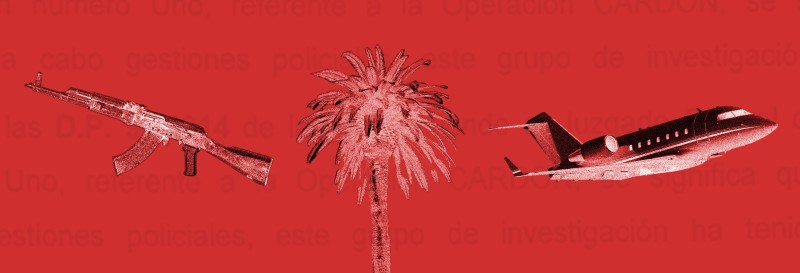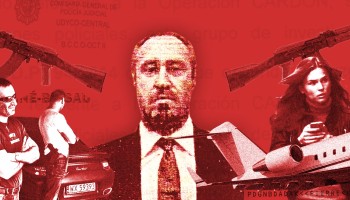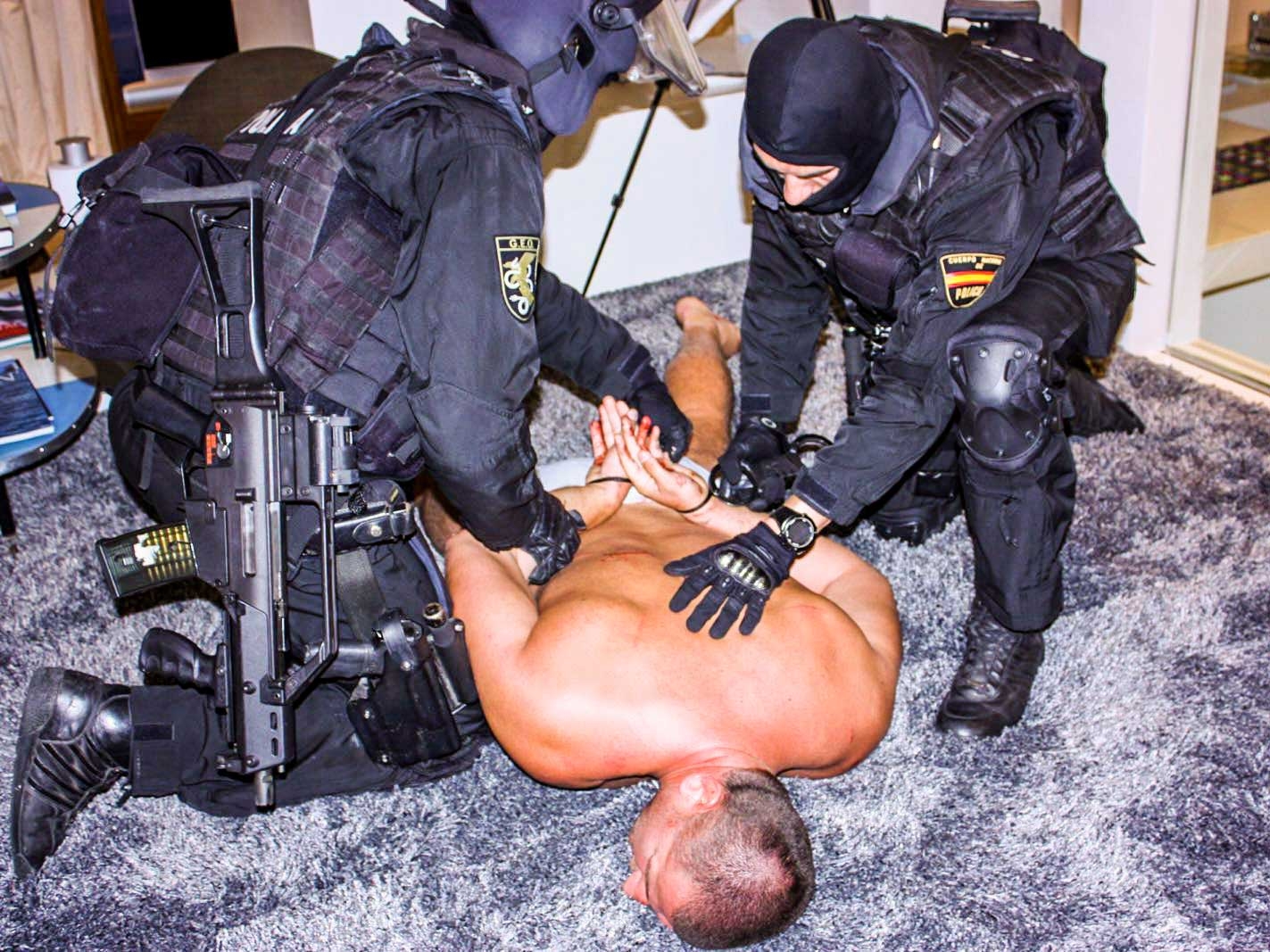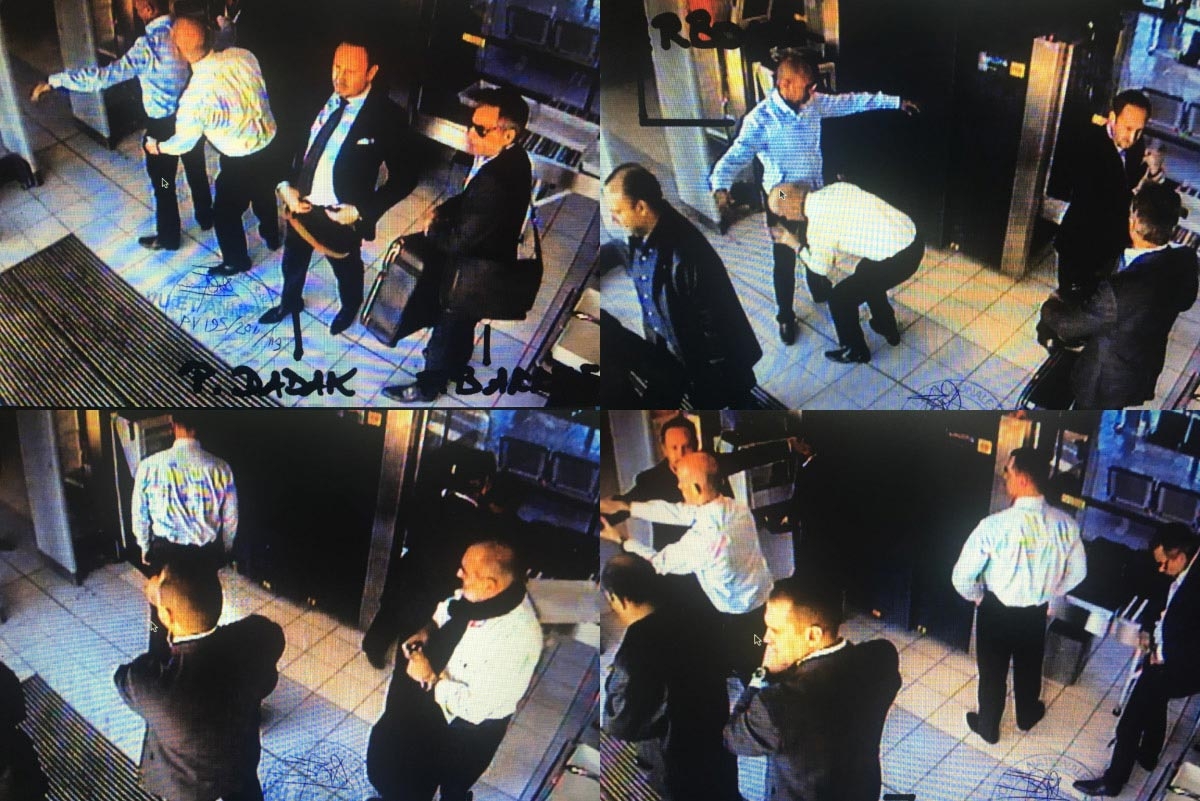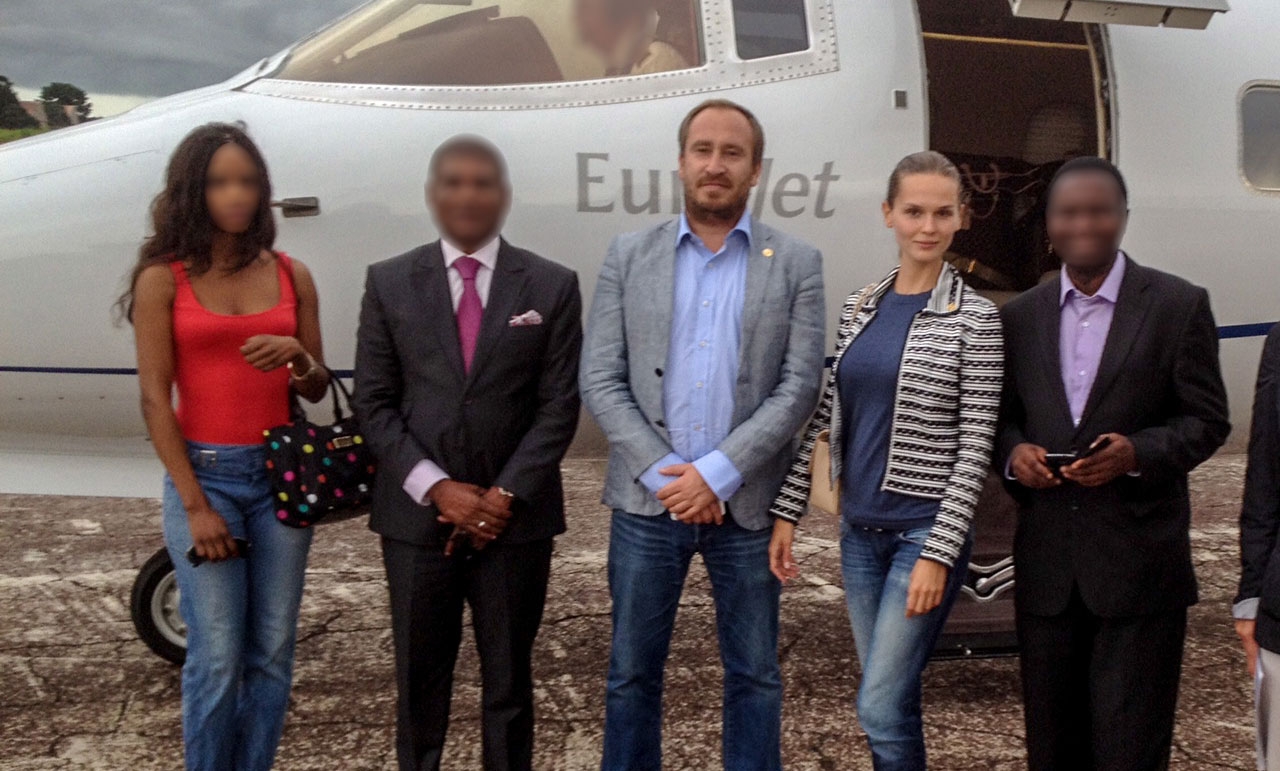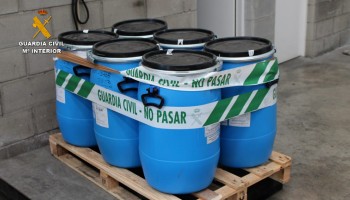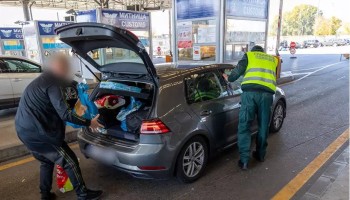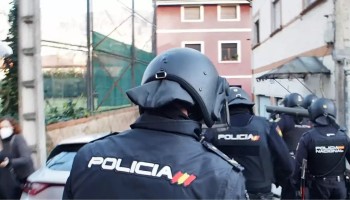The trip to Africa was typical of Pierre Konrad Dadak’s theatrics.
On a chilly January day in 2012, a Bombardier Challenger 601 took off from Warsaw’s Chopin International Airport. The business jet was the property of the government of the Gambia, an impoverished sliver of a country in West Africa. But there were no government representatives on board.
Instead, the jet was filled with an international cohort in search of a major payday. Dadak, a fast-talking Frenchman, was an agent for Poland’s state arms behemoth, Bumar. With him were two Lebanese businessmen, a Canadian defense broker, and two of Dadak’s bodyguards, who were current and former members of Poland’s Government Protection Bureau (BOR), the agency charged with protecting senior officials.
The group had been assembled by Dadak to travel to the Gambia to negotiate a weapons contract worth up to US$ 350 million with the country’s then-dictator, Yahya Jammeh.
But before it had even really begun, the trip started to turn bizarre, two passengers on the flight told the Organized Crime and Corruption Reporting Project (OCCRP) and partners.
To the surprise of the others, the 35-year-old Dadak ordered the plane down in Marseille to pick up another passenger: Franck Barresi, a reputed kingpin of the French city’s mafia.
Barresi kept to himself on the plane, talking only to Dadak. By the time the group reached West Africa, even the mob chief seemed confused about what was going on.
“I remember that Franck Barresi wasn’t comfortable,” said Thierry Carbou, the Canadian businessman. “He was saying ‘I don’t know what I’m doing here.’”
That confusion would soon deepen.
After several days of negotiations, Jammeh’s regime signed off on the deal. But, after everyone returned home, the promised business never materialized. Dadak, who had extracted over $100,000 from his partners in down-payments and private jet costs, kept changing his story and seemed to be stalling for time.
Dadak’s partners told reporters that they eventually realized it had all been a con.
“I mean, everything he said was lies,” said Richard Jreissati, one of the Lebanese businessmen.
But even after reaching that conclusion, things still didn’t make sense.
Why did Dadak walk away with mere thousands of dollars, when millions were on the table?
Why invite a reputed French gangster onto the plane, when he appeared to not even want to be there?
“The big enigma for me,” said Jreissati, “is why all of this happened.”
The Raid
What Jreissati had stumbled on were the elaborate constructs of a small-time Paris crook who had reinvented himself as an impresario of the global arms trade, engaged in alleged fraud, money laundering, and – law enforcement believe – weapons trafficking, an investigation by OCCRP and partners reveals.
For more than half a decade, Dadak played the role of an international man of intrigue, holding court in a gleaming white mansion on the Spanish island of Ibiza. The flight to the Gambia was just one in a series of flashy missteps that had put him on the radar of law enforcement in France, Poland, the United States, Belgium, Germany, Switzerland, and Spain.
On July 14, 2016, the charade ended. About 100 heavily armed Spanish police smashed their way into Dadak’s compound, which bore a fake plaque declaring it a diplomatic compound of Guinea-Bissau, another impoverished West African state. The officers wrestled him to the ground, clad only in his underwear. Also arrested at the same time was Dadak’s ex-girlfriend — a Ukrainian former model named Katerina Dirgina — as well as two Dutch citizens, two of his Polish bodyguards, and a local police officer. From the house, police seized a fleet of nearly a dozen luxury cars, including Bentleys, Ferraris, and a Lamborghini.
The police publicized the raid as the destruction of an international arms trafficking ring believed responsible for selling deadly weapons across the world, including to embargoed countries such as South Sudan.
Crucial elements of the case, however, have stalled. Although Spanish authorities continue to investigate him for crimes including fraud and money laundering, Dadak was released on bail late last year. He is barred from leaving the country. A separate arms trafficking case is languishing due to distrust between European law enforcement agencies.
Reporters from OCCRP and partner outlets spent more than a year going through investigation files from Spain and France, filed multiple freedom of information requests, and conducted dozens of interviews in order to unravel what Dadak was really doing.
The picture uncovered by reporters is disturbing. Dadak’s case unveils a world of international arms trading in which a lack of oversight and accountability can allow even the most brazen hucksters to thrive. It also reveals glaring holes in European law enforcement.
Despite a rap sheet that included fraud and forgery, Dadak was able to rise to a senior position as an agent for Bumar — at the time one of the largest state arms firms in Central Europe — while maintaining a secret partnership with a former Polish deputy defense minister.
Dadak used his title to negotiate hundreds of millions of dollars worth of weapons business in Asia, Africa, Latin America, and the Middle East. But according to his business partners, many of these deals never took place. Instead, they said, Dadak extracted millions of dollars in down-payments and luxury expenses before absconding with the money. Those who crossed him were threatened with gruesome violence.
Dadak also had suspected financial links with Marseilles gangsters, case files show, and is accused of financial scams that stretched across Europe.
Through it all, he seemed to enjoy a measure of protection in Poland, where law enforcement appears to have made only lackluster efforts to pursue him, even after repeated serious allegations. Even as the Spanish police finally closed in in early 2016, Dadak appears to have been tipped off by a leak from within Poland’s security services.
That breach has all but choked off attempts to build an international investigation into his alleged arms trafficking schemes.
“Dadak’s story reflects the complete amoral nature of the arms trade,” Andrew Feinstein, an anti-corruption campaigner and the author of the The Shadow World: Inside the Global Arms Trade, told OCCRP. “The distinction between arms dealers and grifters is extremely fuzzy. A lot of these people are almost caricatures, they have huge personalities, they’re delusional.”
“The extraordinary thing is how company after company, government after government, actually fall for these people. And the reason they do it is because everything that happens in this trade is secret, so it provides absolutely fertile ground for these sorts of conmen.”
Reinvention
Dadak was born in Paris in 1976, the son of immigrants from Communist Poland. He spent his twenties frequenting bars in the city’s tony 16th arrondissement and clubs in the south of the country, flashing money and running a series of petty scams.
Official records show that he was arrested in France at least five times between 2000 and 2006, and was “known [to police] for offenses of concealment, fraud, use of false administrative documents, tax evasion, theft, and voluntary violence.” His last job in Paris, which ended in 2008, was with a software company.
By the end of the decade, however, Dadak had based himself in Poland, where he also held citizenship. He reinvented himself as a mover in the local arms industry, which earns the country hundreds of millions of dollars a year in exports.
Dadak soon found himself a well-connected Polish patron, a businessman named Krzysztof Wegrzyn, who had previously served as deputy defense minister.
Dadak signed a contract with Bumar, the state arms firm, in February 2010. The relationship saw him eventually designated an “adviser to the board” responsible for drumming up business in Africa and Latin America. Wegrzyn, the former deputy defense minister, acted as his silent partner, holding 10 percent of the shares in Rosevar Holdings, a company Dadak had registered in Cyprus to use as a vehicle for working directly with Bumar.
In an interview, Wegrzyn confirmed to reporters that he had partnered with Dadak in order “to help Polish industry conquer new markets,” but refused to go into further details.
His business with Dadak, Wegrzyn said, was to simply provide “consulting services.”
The advisory role put Dadak close to the crown jewel of Poland’s defense industry. Bumar, now known as Polski Holding Obronny (Polish Defense Holding), employs roughly 17,000 people in more than 60 companies that produce weapons, including tanks and ammunition, as well as industrial equipment.
But it’s unclear whether Dadak actually followed through on the deals he pursued on the firm’s behalf. In a response to reporters’ questions, Polish Defense Holding said that Dadak did not complete any sales in the nearly three years he worked as a contractor for the company. Reporters were unable to independently find any instances in which Dadak had successfully made a sale.
Nevertheless, the arrangement appears to have proven lucrative for him.
In interviews, half a dozen of Dadak’s former business partners, as well as three current and former Bumar employees, said that he had used his position to pursue arms deals for the company around the world, at least in some cases with its knowledge. Documents obtained by reporters support these accounts.
The businessmen agreed on Dadak’s modus operandi: He would approach them with promises to make them exclusive agents of Bumar in return for license fees and company registration costs. A huge part of the expenses came in the form of payments for travel.
“This was his technique with his victims who, meanwhile, opened their address book and made appointments with heads of state and ministers,” said Carbou, the Canadian businessman who had accompanied Dadak to the Gambia.
At other times, Dadak would play the role of wealthy and magnanimous host. Visitors to his Ibiza home, where he has lived since at least 2010, described to reporters a tableau that would not have looked out of place in Hollywood. With the Mediterranean Sea glinting below, Dadak and his girlfriend Dirgina entertained their guests, flanked by an ever-present cohort of bodyguards. Descending into the island’s towns and marinas, Dadak partied with a jet-set crowd of European socialites.
Businessmen who dealt with Dadak told reporters that they had paid him millions of dollars in cash and expenses in the hopes of securing arms deals on at least three continents. Documents and interviews show that deals were pursued in countries including the Gambia, Colombia, Libya, India, Cameroon, the Dutch Caribbean, Argentina, Chile, Guatemala, the United Arab Emirates, and Myanmar.
According to his erstwhile partners, Dadak profited handsomely from the purported deals — though none appear to have gone through. At least two people he had dealt with complained to Bumar, but to no immediate result.
Some of the deals, at least, were pursued with the full knowledge of Bumar executives. Reporters obtained contracts signed between Dadak and Bumar in 2010 that gave his company exclusive rights to sell at least $120 million of equipment – including armored vehicles, anti-aircraft missiles, and ammunition – to Colombia’s military. The company told reporters that the sale was never made.
The Gambia deal also received the blessing of senior Bumar officials. Carbou provided OCCRP and partners with the business cards of half a dozen Bumar executives that he had collected at the firm’s Warsaw offices prior to the January 2012 flight to the West African country. His account of the trip matches that given by the Lebanese businessman, Jreissati, in a separate interview, as well as a 2012 complaint filed by Jreissati with Bumar.
Carbou said that former Deputy Defense Minister Wegrzyn appeared to be the one who opened doors for Dadak with the state arms holding company.
In a rambling, more than hour-long interview by phone with OCCRP partner Le Monde, Dadak denied allegations of involvement in criminal activity, and said his work involved “geopolitical forecasting and analysis for Poland and Bumar.”
“I'm portrayed as a Pablo Escobar, but I'm nothing,” he said.
“I do not consider myself a criminal. Quite the contrary.”
Warning Signs
After the bizarre flight to the Gambia in January 2012, the Polish authorities should have had plenty of warning that something was amiss with Dadak.
It turns out that, while making deals on Bumar’s behalf, he was already known to French police, who had been investigating the suspected mobster on the plane, Franck Barresi.
For years, Franck and his two brothers, Jean-Luc and Bernard, had been seen by police as one of the most powerful families in the Marseille underworld, a position that placed them in the top echelon of French organized crime.
In 2012, as the Gambian government jet touched down in Marseille, French police were watching. Since at least 2011, local authorities had been carrying out an investigation into crimes, including suspected money laundering, connected to the Barresi clan.
The fact that Dadak was traveling with bodyguards who had worked for the government’s VIP protection agency, BOR, filtered back to Poland. BOR launched its own internal investigation in 2013, but none of its agents were fired, its successor agency, the State Protection Service, said in response to questions.
The French investigation also uncovered suspected financial links between Dadak and the Barresi clan.
As early as 2011, a company suspected of being linked to Franck Barresi’s network funneled more than €200,000 to one of Dadak’s companies, Vinams Enterprises, according to bank account records that appear in the case files.
The transaction records also show that Dadak was using the same account to collect the down-payments for his Bumar deals in the Gambia and elsewhere.
The case files show that prosecutors in the Polish city of Krakow had been contacted by French authorities as early as October 2012 with requests for information on the company. Again, there is no sign this information was passed on to Bumar.
The French investigation failed to bear fruit. Though Barresi was arrested in 2014, the investigation has since been dropped. Dadak was never charged.
But the information gathered by the French would prove useful later, when the Spanish police began their own investigation.
400 Percent Strange
Dadak’s official run with Bumar came to an end in December 2012, but this had nothing to do with allegations of fraud, connections to organized crime, or any law enforcement action.
Instead, Dadak was dumped by Bumar’s board for a more prosaic reason: He hadn’t earned the company any money.
“He didn’t bring any contracts to us,” said Marcin Idzik, who was then about six months into a term as the company’s vice president. “We decided we should end cooperation with him, because there was no added value.”
None of the warning signs seen by international law enforcement agencies appeared to have filtered through to Bumar, said Idzik, who later served as head of the company from 2013 to late 2015.
What Idzik didn’t know was that despite being cut loose by the arms company, Dadak was continuing to travel the globe carrying Bumar’s business cards and purporting to negotiate deals on its behalf.
In April 2013, Rakesh Sharma, an Indian immigrant who is a co-owner of an import-export business in Montreal, complained about Dadak to Poland’s embassy in Canada.
For nearly two years, Sharma and other business partners had been dealing with Dadak in the hope of setting up deals worth hundreds of millions of dollars in Argentina, Chile, Guatemala and India. Sharma personally spent close to a million dollars on down-payments and travel costs to Dadak, he told OCCRP.
But eventually Dadak’s shifting stories convinced Sharma that the deals were a scam, he said. When he confronted Dadak, he was met with threats.
“He called me and he said ‘I’m going to destroy you and kill all your family, I’m an arms dealer, you don’t know me, I’m this, I’m that,” Sharma said. “He took all my money, my children’s money. Destroyed my life completely.”
Idzik, the former Bumar executive, claims that Sharma’s complaints, conveyed to Bumar via Poland’s embassy in Canada, convinced him to act.
Idzik said that he filed criminal complaints with prosecutors and Poland’s domestic intelligence service, the Internal Security Agency (ABW).
But the authorities came back with a response he found perplexing. According to Idzik, they said that they had been unable to locate Dadak, and so would not pursue the case.
That law enforcement was uninterested in going after alleged fraud in the country’s weapons industry was dumbfounding, Idzik said.
“I was the chief of the biggest Polish defense company and somebody wheedled money,” Idzik said of law enforcement’s apparent reluctance to look into Dadak.
“For me, [is it] strange? Yeah, 400 percent.”
Reporters were unable to independently verify Idzik’s claims. The ABW declined to respond to questions. The Warsaw prosecutors’ office said it had no record of such an investigation.
The Diplomat
Rather than lie low, Dadak responded to his firing from Bumar by engaging in a more brazen round of international deal-making.
In early 2013, Dadak and his girlfriend Dirgina took another private flight to West Africa, this time to Guinea-Bissau. He had decided that his business needed an extra layer of cover: diplomatic immunity.
Dadak arrived in the country promising the government that he would invest in gambling and banking. A €60,000 payment he later made to the country’s honorary consul in Malaga, Spain, secured him a diplomatic passport, according to Spanish case files and interviews.
Without seeking permission, Dadak also affixed a plaque outside his Ibiza home that declared it a diplomatic compound.
New passport in hand, Dadak became more erratic. In October 2013, he flew to Haiti, then still recovering from a horrific 2010 earthquake that killed at least 200,000 people.
According to documents from the Marseille mafia investigation, Dadak traveled to the Caribbean country with two unnamed Canadian business associates. In a meeting in Port-au-Prince with President Michel Martelly, Dadak and the Canadians proposed a $20 billion plan to develop Île-à-Vache, or “Cow Island,” a Haitian satellite island that the French police drily noted is “known as a storage place for cocaine in transit to the United States or Europe.”
It is unclear what this project may have been. At the time, Île-à-Vache was targeted by Martelly’s administration for tourism development, though plans for the island have encountered resistance from local residents.
Apparently interested by the proposal, Martelly arranged for Dadak to fly by helicopter to the island with one of his advisers, a former Haitian senator named Joseph Lambert.
The trip did not go well.
According to the French police, “for an unknown reason [Dadak] threatened the former Senator Joseph Lambert with death.” Returning to the capital, Dadak allegedly tried to “obtain sexual services” at the hotel spa, causing another scene that prompted his Canadian partners to call local police.
Shortly after, Dadak slipped out of Haiti, the report noted. He left his hotel bill unpaid.
Plastics and Guns
Back in Spain, Dadak was finally beginning to draw attention from local law enforcement.
In February 2014, Dadak was briefly detained after a local property manager complained to Ibiza police that the Frenchman had threatened to kill him and his family in a dispute over a home renovation request. According to the manager, Dadak attempted to intimidate him by sending pictures of armed men and military hardware from his Bumar email account.
Reporting back to a police station days later, Dadak arrived with two of his bodyguards and flashed his Guinea-Bissau diplomatic passport. The appetite of local law enforcement had been whet.
In October that year, Spanish police and prosecutors opened an extensive organized crime investigation into Dadak, tapping dozens of phones belonging to him and his associates. They reached out to French authorities, who handed them files from the Marseille mafia investigation. The Spanish also solicited intelligence from the FBI on Dadak’s international dealings.
For years, Dadak had boasted of his close connections to the arms industry as a way of reeling people into his alleged fraud. But with Spanish police now intently listening, his bombast became a liability.
Multiple wiretaps caught Dadak discussing potential arms deals with business partners. He also bragged about weapons to people who had no connection to the industry.
In 2015, while speaking with a Monaco-based agent about buying luxury yachts, Dadak said: “I do the dirty work for governments.”
In another conversation with a French lawyer who specializes in yacht and business jet acquisition, Dadak claimed to own at least seven weapons warehouses across Europe, which were monitored several times a day by satellites.
The Spanish investigation soon revealed that, following his expulsion from Bumar, Dadak had built a fresh business network.
In late 2013, he had begun establishing a family of companies across Europe that purportedly dealt in plastics and polymers, all operating under the name Polietica. Based out of a shell company in the US state of Delaware – and falsely claiming to possess €235 million in capital – the company had branches in Spain, Belgium, the United Kingdom, and Germany.
Investigators became convinced that, in fact, Dadak was using the firm as part of an arms dealing operation.
In January 2015, the FBI informed Spanish police that the agency suspected him of being involved in an attempt to sell weapons to South Sudan, a country in the grips of a brutal civil war that is also subject to a European Union arms embargo.
According to the FBI, in May 2014, Dadak used an email address of the plastics firm, Polietica – adopting the false name Jennifer Forbes – to communicate with South Sudanese rebels. The order was huge, and included 40,000 Kalashnikov rifles, 30,000 machine guns, hundreds of anti-aircraft missiles, and hundreds of thousands of boxes of ammunition.
It is unclear whether the sale ever went ahead. The allegations were taken seriously enough that, following Dadak’s arrest, the potential deal was investigated by a United Nations expert panel focusing on South Sudan, where tens of thousands of people have been killed in civil war since late 2013. The investigation has so far been inconclusive.
The Spanish wiretaps also show that, despite having left Bumar in 2012, Dadak stayed in contact with his partner, the former deputy defense minister Wegrzyn.
(The Spanish investigators appear to have missed this lead, however. Transcripts of three conversations obtained by OCCRP misidentify Wegrzyn’s phone as belonging to another former Bumar executive.)
In one 2016 conversation, the two men were recorded obliquely discussing business. Wegrzyn told Dadak: “The merchandise is there and we can act.”
Later in the conversation, Dadak mentioned “cars and ammunition,” but it is unclear from the context what he meant.
When asked by reporters about the conversations, Wegrzyn denied that he had been discussing business with Dadak. When asked to elaborate, he said: “I don’t remember.”
“I’m Going to Tear Out Your Eyes”
Likely the biggest contributor to Dadak’s downfall at the hands of Spanish law enforcement was a series of suspicious transactions involving his Polietica network of companies.
In May 2015, Belgian investigators froze an account holding money related to what they suspected was a scheme, involving purchases and sales of materials by Polietica’s Belgian branches, to defraud the country of millions of dollars worth of VAT refunds. The freezing of the account meant that, overnight, Dadak was more than €1.75 million out of pocket.
Spanish police watched as the pressure caused Dadak to lose control of his prodigious temper. He began aggressively squeezing acquaintances and partners for money.
In August 2015, a German lawyer who had worked for Dadak filed a report with police in Palma de Mallorca. He had broken off dealings with Dadak and had returned hundreds of thousands of euros to him, he told police. But Dadak demanded more.
In text messages, Dadak called the lawyer a “F***in gay german f***er” and threatened to “smash” him if he didn’t pay the money.
In September, Dadak summoned the lawyer to a Madrid hotel and, along with his bodyguards, beat him, according to Spanish investigation documents.
Dadak also dished out similar treatment to Gabriel Plaza Herrera, an honorary consul for Guinea-Bissau in the southern Spanish city of Malaga, who had helped him secure the diplomatic passport.
Wiretaps picked up Dadak demanding back the €60,000 he paid for the passport, and threatening Plaza and his family.
“I’m going to kill you. I’m going to tear out your eyes, I’m going to take them out of your face. I’m going to cut your Achilles tendon with a knife. You won’t be able to walk anymore,” Dadak said. Plaza paid back part of the money.
With Dadak turning ever more erratic, Spanish police started their endgame. But Dadak’s connections in Poland appear to have helped derail part of the investigation.
In mid-February 2016, police from Germany, Switzerland, Belgium, and Poland arrived in Madrid on the invitation of Spanish authorities. Under the auspices of Europol, the officers spent two days discussing the arms investigation into Dadak, the agency confirmed in response to a freedom of information request made by reporters. (French police, who were also invited, did not turn up.)
But nine days after the meeting had finished, Spanish wiretaps picked up something worrying: an apparent leak.
“This week I was called by an old acquaintance, a general,” Marek Sajdak, one of Dadak’s bodyguards, told his colleague, Roman Romanik.
The general had a warning, Sajdak recounted. “Someone has something against [Dadak].”
Spanish police took this seriously enough that they relayed news of the apparent leak via Europol, the agency confirmed in its response.
Asked about the leak, Polish police gave contradictory answers. In an initial response, they denied any knowledge of the Europol meeting in Madrid. When later told that reporters had documents of the meeting, they acknowledged it took place, but declined to comment.
For Spanish police, the breach scuttled attempts to build an international case with the help of their Polish colleagues.
“The leak from the Polish authorities made us stop trusting them,” said a law enforcement source who spoke anonymously because of the ongoing investigation.
“We haven’t had much cooperation with them since then.”
Downfall
Without Polish help, Spanish police then moved to take Dadak down, relying on a case largely built around the activities of his Polietica network of plastics companies, as well as a series of other alleged local frauds and threats.
By July 2016, finally armed with warrants against Dadak and a dozen associates, Spanish National Police raided his Ibiza home. The haul from the arrest included access to tens of thousands of Dadak’s emails and, police soon concluded, evidence of possible arms deals involving more than two dozen countries across the world.
Meanwhile, as news of Dadak’s dramatic arrest burst into the media, Polish authorities launched what appears to have been a desultory investigation.
Agents from a branch office of Poland’s domestic intelligence agency in the southeastern city of Rzeszow questioned a series of figures who had ties to Dadak. Those interviewed included current and former executives of Bumar and private Polish arms firms.
Two of those interviewed by the agency described to reporters what they said appeared to be an unenthusiastic process.
“This investigation [was] leading nowhere,” said Leszek Potentas, an administrator of the Polish branch of one of Dadak’s companies, Rosevar. “The officer who interrogated me was less than 30 years old.”
In a response to questions from reporters, the prosecutor’s office in Rzeszow said it had launched an investigation into Dadak in August 2016. The investigation was suspended “awaiting an application for international legal assistance from the Spanish side,” the response said.
In the absence of international cooperation, Dadak has so far avoided charges for some of the most serious crimes raised in the investigation.
He was released on a €30,000 bail last December. He is currently living in Ibiza, his passport confiscated, while investigators continue putting together the case for a likely future trial.
Dadak was not home when reporters recently came by his hillside mansion. His large infinity style swimming pool had mostly evaporated, leaving behind a stagnant, scum-filled green pond.
According to law enforcement sources, the main investigation into Dadak – which is likely to go to trial – is centered on charges of organized crime, extortion, bribery, and money laundering, and not weapons.
Evidence collected about suspected arms trafficking has been spun off by Spanish authorities into a separate, more secretive investigation. The investigation is active, but is struggling because of a lack of international cooperation, law enforcement sources say.
It is still unknown whether Dadak’s years in the arms industry ever resulted in any real weapons sales. Was he an arms dealer? Or just a conman who played one?
Carbou, the Canadian defense broker who flew to the Gambia, is skeptical.
“I doubt he ever sold one bullet,” he said.
In a recent interview, Dadak himself was cryptic. When asked by a reporter for details on his purported arms deals, he gave a curt, two-word response:
“Top secret.”
Additional reporting by Lion Summerbell, Daniel Montero Bejerano, Joan Tilouine, Simon Piel, Edyta Zemla, Bernhard Odehnal, Sophie Balay, N’Dea Yancey-Bragg, Monica Cordero Sanco, Katarina Sabados, Chris Benevento, and ARIJ Data Desk.
This story was reported in collaboration with journalists from Le Monde, El Español, Newsweek Polska, TVN, and Fundacja Reporterow.
